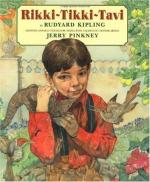|
This section contains 226 words (approx. 1 page at 400 words per page) |

|
Rikki-Tikki-Tavi Summary & Study Guide Description
Rikki-Tikki-Tavi Summary & Study Guide includes comprehensive information and analysis to help you understand the book. This study guide contains the following sections:
This detailed literature summary also contains Bibliography on Rikki-Tikki-Tavi by Rudyard Kipling.
Rudyard Kipling's endearing "Rikki-Tikki-Tavi" initially appeared in 1895 as part of the second volume of The Jungle Book, a collection of children's stories set in colonial India that Kipling wrote while living in Brattleboro, Vermont. Telling the tale of Rikki-tikki-tavi, a brave and heroic mongoose, and his battle against the evil king cobras, Nag and Nagaina, "Rikki-Tikki-Tavi" is a war story that depicts in the simplest of terms the triumph of good over bad. Emulating the contemporary trend in children's literature to create imaginary worlds to appeal to a child's imagination, "Rikki-Tikki-Tavi" takes place entirely in a small garden populated by anthropomorphized birds, snakes, muskrats, and frogs.
By imparting values particularly characteristic of Kipling's Victorian society, including loyalty, productivity, hard work, and courage, the story serves an educational purpose. "Rikki-Tikki-Tavi" also implicitly affirms the Victorian assumption of British superiority and its faith in the inherent goodness of empire-building.
In its use of suspense and pacing, "Rikki-Tikki-Tavi" is a wonderful example of Kipling's expertise in storytelling and a testament to why his stories remained popular into the early 2000s. "Rikki-Tikki-Tavi," both as part of The Jungle Book and as an independent story, appeared in numerous incarnations throughout the twentieth century. As of 2004, numerous versions of The Jungle Book volumes were in print, including a paperback version by Penguin that included a critical introduction by Daniel Karlin.
Read more from the Study Guide
|
This section contains 226 words (approx. 1 page at 400 words per page) |

|



